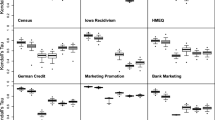Abstract
Naive Bayes has been widely used in data mining as a simple and effective classification algorithm. Since its conditional independence assumption is rarely true, numerous algorithms have been proposed to improve naive Bayes, among which tree augmented naive Bayes (TAN) [3] achieves a significant improvement in term of classification accuracy, while maintaining efficiency and model simplicity. In many real-world data mining applications, however, an accurate ranking is more desirable than a classification. Thus it is interesting whether TAN also achieves significant improvement in term of ranking, measured by AUC(the area under the Receiver Operating Characteristics curve) [8,1]. Unfortunately, our experiments show that TAN performs even worse than naive Bayes in ranking. Responding to this fact, we present a novel learning algorithm, called forest augmented naive Bayes (FAN), by modifying the traditional TAN learning algorithm. We experimentally test our algorithm on all the 36 data sets recommended by Weka [12], and compare it to naive Bayes, SBC [6], TAN [3], and C4.4 [10], in terms of AUC. The experimental results show that our algorithm outperforms all the other algorithms significantly in yielding accurate rankings. Our work provides an effective and efficient data mining algorithm for applications in which an accurate ranking is required.
Preview
Unable to display preview. Download preview PDF.
Similar content being viewed by others
References
Bradley, A.P.: The use of the area under the ROC curve in the evaluation of machine learning algorithms. Pattern Recognition 30, 1145–1159 (1997)
Cohen, W.W., Schapire, R.E., Singer, Y.: Learning to order things. Journal of Artificial Intelligence Research 10, 243–270 (1997)
Friedman, N., Greiger, D., Goldszmidt, M.: Bayesian Network Classifiers. Machine Learning 29, 103–130 (1997)
Hand, D.J., Till, R.J.: A simple generalisation of the area under the ROC curve for multiple class classification problems. Machine Learning 45, 171–186 (2001)
Keogh, E., Pazzani, M.: Learning augmented bayesian classifiers. In: Proceedings of Seventh International Workshop on AI and Statistics. Ft. Lauderdale (1999)
Langley, P., Sage, S.: Induction of selective Bayesian classifiers. In: Proceedings of the Tenth Conference on Uncertainty in Artificial Intelligence, pp. 339–406 (1994)
Merz, C., Murphy, P., Aha, D.: UCI repository of machine learning databases. Dept of ICS, University of California, Irvine (1997), http://www.ics.uci.edu/~mlearn/MLRepository.html
Provost, F., Fawcett, T.: Analysis and visualization of classifier performance: comparison under imprecise class and cost distribution. In: Proceedings of the Third International Conference on Knowledge Discovery and Data Mining, pp. 43–48. AAAI Press, Menlo Park (1997)
Provost, F., Fawcett, T., Kohavi, R.: The case against accuracy estimation for comparing induction algorithms. In: Proceedings of the Fifteenth International Conference on Machine Learning, pp. 445–453. Morgan Kaufmann, San Francisco (1998)
Provost, F.J., Domingos, P.: Tree Induction for Probability-Based Ranking. Machine Learning 52(3), 199–215 (2003)
Quinlan, J.R.: C4.5: Programs for Machine Learning. Morgan Kaufmann, San Mateo (1993)
Witten, I.H., Frank, E.: Data Mining –Practical Machine Learning Tools and Techniques with Java Implementation. Morgan Kaufmann, San Francisco (2000)
Ling, C.X., Zhang, H.: Toward Bayesian classifiers with accurate probabilities. In: Proceedings of the Sixth Pacific-Asia Conference on KDD, pp. 123–134. Springer, Heidelberg (2002)
Author information
Authors and Affiliations
Editor information
Editors and Affiliations
Rights and permissions
Copyright information
© 2005 Springer-Verlag Berlin Heidelberg
About this paper
Cite this paper
Jiang, L., Zhang, H., Cai, Z., Su, J. (2005). Learning Tree Augmented Naive Bayes for Ranking. In: Zhou, L., Ooi, B.C., Meng, X. (eds) Database Systems for Advanced Applications. DASFAA 2005. Lecture Notes in Computer Science, vol 3453. Springer, Berlin, Heidelberg. https://doi.org/10.1007/11408079_63
Download citation
DOI: https://doi.org/10.1007/11408079_63
Publisher Name: Springer, Berlin, Heidelberg
Print ISBN: 978-3-540-25334-1
Online ISBN: 978-3-540-32005-0
eBook Packages: Computer ScienceComputer Science (R0)




